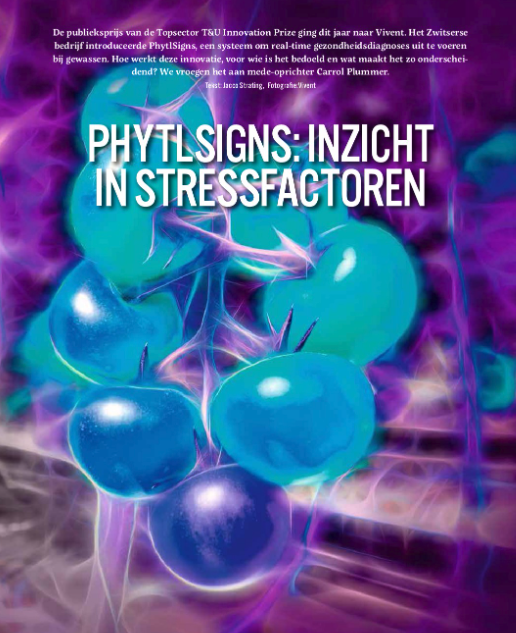KAS magazine published a beautiful 2 page article on Vivent in January 2021 and we had requests for an English translation. The actual article is available here: KAS Feature.
The English translation is shown below.
-What is Vivent, who started the company and when was it started?
Vivent SA is a Swiss deeptech company founded in 2012 by serial entrepreneurs Carrol Plummer, Nigel Wallbridge and Caleb Carroll. They have worked together for over 20 years bringing some very innovative concepts to market.
In the Netherlands the blue screens at the ends of NS train carriages are an example of technology brought to market by this team as part of a business they previously co-founded, Nomad Digital. Nomad was sold to Alstom in 2017 and since then the founders have been working full time on crop diagnostics at Vivent.
-With what product did you enter the Topsector TU Innovation Prize contest?
PhytlSigns, a system for real-time diagnosis of crop health is the product we entered in the TopSector contest. The greenhouse growers we’ve spoken to are keen to use the sensor to see how their plants are responding in real time to climate changes, fertigation, pests and fungal infections.
-How does your product work and for who is it meant?
We measure small electrical signals emitted by plant cells to, control growth, mount defenses and adapt to environmental changes. These signals are analysed using machine learning. We then use machine learning models to track either general or specific plant stressors in real time.
There is still a lot to learn in this area but right now growers can monitor some common greenhouse stressors like drought, spider mites or nutrient deficits with the system. Breeders can use the system to tell if one plant variety is more prone to stress than another and finally agrochem companies can see how plants are responding to both stressors, like nematodes, and to treatments, including plant defense inducers or other biologicals.
-What makes your product innovative and distinctive?
Electrical signals in plants have been measured for over 100 years, starting with an Indian scientist called Jagdish Chandra Bose, but interpreting the signals is difficult because they are very complex. Signals can emanate from many parts of the plant and they overlap in time and space. We had a real breakthrough when we started applying artificial intelligence to the signals. Now we can differentiate a number of different stressors and can diagnose problems days before visual symptoms appear.
A really great aspect of measuring plant electrophysiology is that we see the impact of nearly every kind of stressor to which a plant reacts. It is a very comprehensive solution for understanding plant physiology.
-What is your reaction the winning the public award?
We were delighted to win the public award. The Netherlands is our most important market and we’ve been delighted with how open and how interested everyone has been in PhytlSigns. We are experts in signal recording and analysis but we need lots of input from growers and agronomists to make electrophysiology a really valuable tool for farmers. The strong history of innovation in horticulture coupled with an acceptance of or even enthusiasm for working collaboratively explains why crop yields are so high in the Netherlands. The HortiHeroes training and award introduced us to a really inspiring community that is keen to bring even more innovation to horticulture and agriculture.
-What will be the next steps for this product?
We are just starting to sell crop monitoring services so the first step is make the early sales, deliver value for our clients and then refine our solution so that it provides early warning of many different types of crop stress for growers and speeds up trait analysis for breeders. Feedback from early users will be key to ensuring that our solution is easy to use and integrates with other platforms growers use to manage their operations. We will be integrating plant electrophysiology into greenhouse control systems like nutrigation and climate management. The plants can turn irrigation pumps on themselves when they need more water but the growers will be able to set limits for the plant stress to ensure their produce is really tasty.
Many Dutch growers and breeders are already enthusiastic about data driven growing and we are sure they will learn even more about their plants by seeing how the plants respond in real time to environmental changes. It is a privilege to be able to work alongside them.
-What is the ambition or the company?
Our ambition is to help growers improve their yields while reducing inputs like energy or water and to provide reliable and early alerts of crop stress so growers can choose environmentally preferable crop protection treatments. We’ve started in the horticulture sector but will expand to higher value outdoor crops like citrus and nut trees, olives and vines in due course and we will also launch a handheld sensor for disease detection.
Learning more about how plants transmit information between the roots and shoots will help us turn plant intelligence into business intelligence.
Would you like to learn more about PhytlSigns? Click here.

